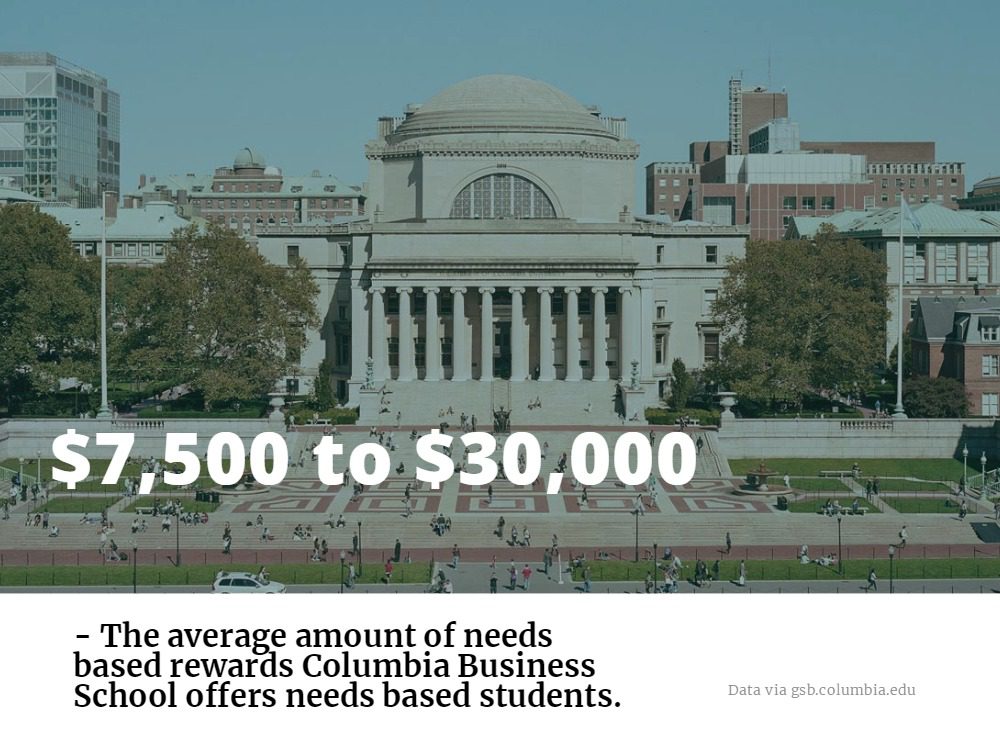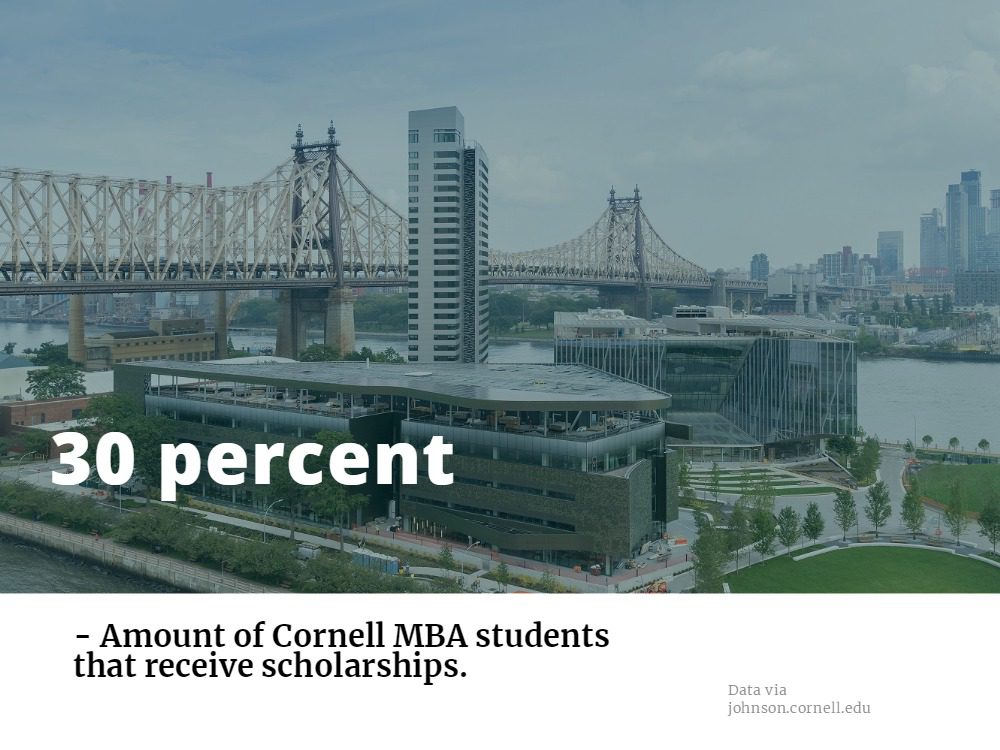How NYC Business Schools Help the Underprivileged Applicants

Pursuing an MBA is a shrewd move for anyone looking to earn a competitive salary right out of school. Though attending a renowned school can up the price tag of earning an MBA, it may also increase the overall return on investment. According to an article in U.S. News & World Report, “… graduates of top-tier business schools usually earn higher starting salaries than their peers who went to lower-ranked schools.”
It’s not jut the opportunity to have a lucrative job right out of school that makes a high starting salary appealing. An enviable starting salary could mean more earning potential down the line. However, a top-tier school may seem out of reach for low-income applicants. After all, how can you enjoy the return on investment if you can’t afford to invest in the first place?
Luckily, many prestigious business schools offer resources for students from different socioeconomic backgrounds. Below, we’ve outlined the resources available for low-income applicants at five of New York City metro’s best business schools.
How NYC Business Schools Help the Underprivileged
Columbia Business School
Columbia Business School offers need-based awards to many students, which may result in anywhere from $7,500 to $30,000 in tuition support. Nearly half of applicants receive need-based scholarships, which are automatically renewed at the start of the second year. Columbia students can also apply for private and federal loans. To create incentive for students to choose careers in public and nonprofit fields, the school offers a Loan Assistance Program for students who utilize their education to pursue these paths. Students are eligible to apply for this program for up to five years after graduation. Depending on the extent of students’ debt, they may receive anywhere from $2,000 to $10,000 of annual support. Columbia students may also receive merit-based scholarships, such as the Columbia Fellows Program, which may cover full or partial tuition and is granted to applicants with an outstanding track record in leadership and creativity.

Stern School of Business—New York University
NYU’s Stern School of Business offers a variety of scholarships for high-achieving applicants. According to the school’s website, nearly a quarter of students who enter the full-time MBA program receive a merit-based scholarship. There are also additional merit-based opportunities for students coming from different backgrounds and perspectives. Scholarships like the Advancing Women in Business Scholarship and the Forte Fellowship are particularly geared toward female-identifying students, to support women in business. The ROMBA Fellowship aims to help LGBTQ students succeed in business education. The Consortium Fellowship exists to increase the number of minorities such as Hispanic Americans, Native Americans, and African Americans in business school as well.
Gabelli School of Business—Fordham University
At the Fordham University Gabelli School of Business, graduate students may be eligible for federal financial aid, merit scholarships, or a variety of graduate assistantships. Awards based on academic excellence range from $10,000 to full tuition. Exceptional students may be eligible for awards like the Dean’s Premier Scholarship, which includes a $20,000 living stipend, and may include a stipend toward one of Fordham’s global programs. Students can also apply for a plethora of need/merit-based scholarships, like the Hitachi Diversity and Inclusion Scholarship, which seeks to help underrepresented minorities finance their education.
Rutgers Business School, Newark and New Brunswick
The Financial Times ranked Rutgers Business School among the top 50 MBA programs for return on investment in 2017, citing a 130 percent increase in salary for students within three years of completing their degree. Moreover, the school’s website states that, “More than 80 percent of Rutgers students receive some form of financial aid.” Moreover, at $31,011 per year (not including fees), this program is far more affordable than many other prestigious schools. Students can apply for federal or private loans, grants, and an array of scholarships. In addition to the awards offered by the Rutgers Business School Graduate Scholarship Fund, the Rutgers website lists 30 fellowships, scholarships, and partnerships. The Ralph Bunche Fellowships, for example, provide tuition remission, and a $15,000 living stipend to minority students from disadvantaged socioeconomic backgrounds.
SC Johnson Graduate School of Management—Cornell University
Around 30 percent of entering the SC Johnson Graduate School of Management students receive some level of scholarship support. Scholarships like the National Society of Hispanic MBA’s (NSHMBA) and the TOIGO Fellowship specifically seek to help underrepresented minorities. The MD MBA Dual Degree Program and Lee Family Scholarship supports students on the rigorous path to receive their MD/MBA. Additionally, Cornell’s Park Leadership Fellows Program awards full tuition to up to 25 MBA applicants annually. The award is granted based on personal and professional achievements, academic performance, social contributions, and leadership. Students can also apply for federal and private loans.

2017 Forté Foundation MBA Women’s Leadership Conference

Every year, hundreds of women MBA candidates from around the U.S. gather before their first semester to attend the Forté Foundation MBA Women’s Leadership Conference. This year–the tenth anniversary of the event–the sold-out conference took place in Seattle, Washington on June 16-17.
The McCombs Scholarships You Need To Know

For many students looking to pursue a graduate business degree, the cost of an MBA can be a huge deterrent. As an unfortunate result, many qualified and ambitious student choose to not pursue the furthered education they deserve. Luckily, most business schools offer exemplary scholarship remedies to help alleviate costs. For those looking to pursue an MBA at Texas A&M University, we’ve listed the McCombs scholarships you need to know.
Continue reading…
What Bain & Company Looks for in MBA Hires

Bain & Company—widely considered one of the most elite consulting firms in the world—is a coveted post-MBA destination for students at top business schools in every part of the globe. Headquartered in Boston with 53 offices in 34 countries around the world, Bain employs more than 7,000 people and counts as its clients leading Fortune 500 companies, as well as nonprofit and government organizations. And business is booming.
According to Keith Bevans, Global Head of Consultant Recruiting, the company has grown at a rate of 15 percent a year for the past 20 years, with no slowdown in sight. “We hire a little over 400 consultants a year—and that growth comes from the top business schools in the world,” he says. While the company primarily targets top-20 schools for MBA recruiting, it hires from more than 60 schools around the world and is committed to finding the best talent wherever it can.
Bevans is a Bain-lifer. He started as an associate consultant out of MIT, where he earned his bachelor’s and master’s degrees in engineering. He left Bain to get his MBA at Harvard Business School but returned upon graduation and has been there ever since. For much of his career, he was a client-facing partner in the firm’s Performance Improvement practice, with a focus on processes to improve effectiveness and efficiencies. Now he’s putting that expertise to work for his own company, and he couldn’t be happier.
His allegiance to the firm is clear, and it’s based in great part on his intimate understanding of its culture, which he describes as steadfastly collaborative and supportive. And he’s not alone. Bain frequently tops the “Best Places to Work” lists for Glassdoor, Vault and Consulting magazine, with employees praising its “great people and culture” and calling it “an incredible place to learn” and “the best place to start your career.”
It’s people, too, set Bain apart, Bevans agrees. “They are very smart, very passionate, maniacally focused on making a difference in whatever they are doing—and they wrap all of that in a layer of humility, which I think is very rare to find.”

Bain Partner Keith Bevans, Global Head of Consultant Recruiting
But interns alone are not enough to keep up with Bain’s growth. “It varies from year to year in terms of how many of our full-time hires are former summer interns, new full-time hires or former consultants. But the internship program never fills up the whole group.”MBA graduates are a big and important part of the company’s hiring, and many start out as interns in the 10-week summer associate program between their first and second years of business school. “It’s definitely an important on-ramp,” he says of the internship program, adding that it’s also a valuable opportunity for both Bain and its interns to determine fit. Notably, 90 percent of interns return to work for Bain full-time, Bevans adds. And there’s not a maximum cap on intern hires. “Our summer program is limited only by how many great students we can find,” he says. “We don’t have a target—rather I like to think of it as a minimum. If we find more great people, we will always go over whatever we set out for.” Which means there are opportunities for second-year students who may not have targeted Bain or consulting in their first year.
But interns alone are not enough to keep up with Bain’s growth. “It varies from year to year in terms of how many of our full-time hires are former summer interns, new full-time hires or former consultants. But the internship program never fills up the whole group.”
Don’t miss Clear Admit’s exclusive interview with Bevans, in which he talks about the firm’s commitment to employee training and support, goes into detail about Bain’s MBA recruiting process, shares where he looks and what he looks for in MBA hires and more. Our thanks to Bevans for making the time to share more about Bain with the Clear Admit audience.
Corporate Recruiter Q&A: Bain & Company’s Keith Bevans
Clear Admit: What sets Bain apart—not only among other consulting firms but also as an employer or company overall?
Keith Bevans: There are a couple of things about Bain people that set us apart. In my role, I have had the opportunity to travel to offices around the world hiring people, and what I have found is that Bain people are passionate about both the work they are doing and the things they are doing outside of work. They really jump right in with both feet. When you align that around our goal of having our clients be successful, you can really see the passion Bainies have for their clients—it just oozes out of them. We are having a big impact on our clients, and we are hiring people who are really energized by that.
With that as our starting point, we put them in an environment where we really do act like one team and do everything we can to support them in their professional life. From our global training programs to our onboarding program to the career counseling we provide—it’s all aligned around helping them be successful and be the best they can be. Bain people are people who want to have an impact.
Relative to other firms I think we are different in the sense that we have a very collaborative culture. We also have tremendously deep expertise in every major sector of the economy, and we bring that to our clients. “We’ve studied this and analyzed this, but why don’t we marry that with your expertise?” we’ll say to clients. We are not trying to prove that we are smarter than our clients but to work collaboratively with them to position them to succeed.
CA: How important are MBAs in your overall hiring? How many MBAs do you hire each year, both interns and full-time? Are you continuing to grow at the 15 percent rate you’ve enjoyed for so many years?
KB: MBA talent is a big and really important source of talent for us. For the last 20 years, we have been growing on average at a rate of 15 percent per year. That makes for a phenomenal slide when I put it in front of recruits. We hire a little over 400 consultants a year, and that growth comes from the top business schools in the world. The bulk of our targeted efforts focus on top 20 programs, but we have hired from almost 60 different MBA programs around the world.
With our growth, our primary focus is to make sure we are finding the most talented people out there. The breadth of schools from which we’ve hired shows that we are continuing to do innovative things through the Bain Passport and Webinar series to connect with students wherever they are. Our intern program this summer is once again—for the third or fourth year in a row—the largest we have run as a firm. It is definitely an important on-ramp, if you will. And 90 percent of the MBA interns who come for the summer return to Bain afterwards. We find the best, bring them in for the summer and very often they start their careers with us.
As for the 10 percent who don’t return—most of the time it’s actually more of a mutual thing. Maybe they tried consulting and decided it’s not a fit for them. And here’s another example of the supportive part about Bain: Even the interns who don’t come back often get support from the people who worked with them at Bain. They help them identify what parts of the internship were the right fit, and what roles might be a better match and then they help connect them with people who can help. After all, they are still Bain alums and still part of the Bain family.
Forté Foundation Launches New Men as Allies Initiative

Reaching gender equity on business school campuses is far from just a women’s issue, which is precisely why the Forté Foundation is calling on men to get involved. Drawing on successful programs already underway on campuses spanning from Harvard Business School (HBS) to Stanford Graduate School of Business, Forté today announced its new Men as Allies Initiative. It is designed to invite and encourage male students to get involved in a growing movement toward gender equity in business school classrooms and the broader business world.
The idea for the new initiative grew out of a session with sponsors at Forté’s annual conference focused on HBS’s Manbassadors ally group, according to Forté Executive Director Elissa Sangster. Forté is a non-profit consortium of leading corporations and top business schools committed to helping women lead fulfilling careers in business. “We started talking with our sponsors about how Forté could support similar initiatives at our member schools’ campuses,” she says. “We began to brainstorm about what we could provide so it didn’t end up that every time someone wanted to do this they had to call the Manbassadors and ask them the same questions over again.”

Forté recognized at least ten top business school campuses that already have male ally programs in place. HBS, Kellogg’s Northwestern School of Management and Duke’s Fuqua School of Business led the charge, forming their groups in 2013. The following year, UCLA Anderson, Michigan’s Ross School of Business, the University of Pennsylvania’s Wharton School and Stanford GSB got with the program. In 2015, Columbia Business School and NYU Stern joined in, and London Business School (LBS) created its own club earlier this year. Calling themselves everything from Manbassadors (Anderson, HBS, LBS, CBS) to WiMEN (Stanford) to the 22’s (Wharton, a reference to the 22 percent gain necessary to close the gender pay gap), the groups work in partnership with women’s business organizations on campus to adopt behaviors that support gender equity in classroom discussion and beyond.
Conducting focus groups with existing groups, Forté began to collect information on what has been successful, what pitfalls and challenges can be avoided and what types of events and activities best serve to open up dialogue. “We also conducted external environmental research, identifying inspirational role models and people leading the charge in the business world,” Sangster says.
The new Forté Men as Allies Initiative is designed to provide potential male allies at schools that don’t already have existing groups with the tools they need to establish their own Manbassador-type groups. As part of the new initiative, Forté has launched a new “Men as Allies” website featuring a toolkit geared toward male students that includes reasons to start a group, steps to follow to do so and information on activities and events that have been successful on other campuses. “Our hope is that as men graduate from MBA programs, they are able to take some of these skills they have been developing and look for ways to engage in the workforce and make that impact even more widespread,” Sangster says.
A Tipping Point
There has been a growing movement in recent years to enhance gender equity in business and society, evidenced by the United Nations’ HeForShe initiative, Catalyst’s Men Advocating Real Change (MARC), and the White House’s Let Girls Learn program. In summer 2015, the 47 business school leaders convened at the White House specifically to address the gender imbalance among MBA classes. In addition to male ally groups, many business schools also feature school-wide initiatives designed to tackle gender equity at the cultural, academic and admissions levels, such as the Gender Equity Initiative (GEI) at UC Berkeley’s Haas School and the HBS Gender Initiative.
“We may have reached a tipping point as more women are pursuing an MBA and more men are interested in supporting gender equity,” Sangster continued. “While we are making great progress, and getting closer to 40 percent women’s enrollment at our member business schools, initiatives like this one that foster inclusiveness, will help us get to gender parity faster.”
Carnegie Mellon University’s Tepper School of Business, Cornell’s Johnson Graduate School of Management and Georgetown’s McDonough School of Business provided generous financial support of Forté’s new initiative, and diversity experts Anne Weisberg and Lisa Levey, among others, contributed to its development.
Sangster points out that there are multiple benefits for men who get involved in gender equity initiatives. “It gives them insight and information and resources to use in developing their own leadership styles and creating their own perspective on what’s important not only to advance women in the workforce but also just to be a well-rounded advocate and manager of talent in their organizations,” she says. “It’s really about fine-tuning their leadership perspective and leadership skills. Business school is a safe place to stretch your muscle in this area and think hard about the kind of leader you want to be and how to become that leader.”
